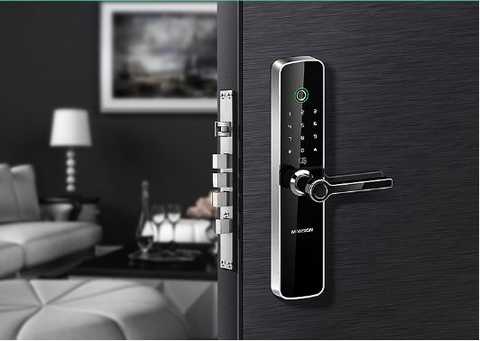HC Security Network News as of Things, cloud computing, big data continues to mature and application technology, as well as people's pursuit of continuous improvement of quality of life, the sudden emergence of smart home industry. At the product level, following the smart router, smart camera, and smart audio, the smart door lock became the new darling of the market in 2017.
Recently, the Beijing TV Youth Channel "Who is Saying" column has made in-depth coverage of the security of smart locks, and can open fingerprint locks and face recognition smart locks on the network's rubbing fingerprints, silicone fingerprints, and face photos. The rumors were experimentally proved, and the results of the experiment beat the faces of those who did not use their minds and spread the rumors.

Reports show that although many smart communities in various communities have promoted smart locks, and there are discount notices for replacing smart locks everywhere, most residents said that they don’t know much about smart locks and the security of smart locks is even more It is doubtful.
What users are most worried about is, what can I do if I can't enter the house after the smart lock is out? The user's worries are of course also reasonable. After all, their awareness of smart locks is not enough. According to the survey, 90% of users do not know the smart lock brands on the market, and they don't know if the smart locks are unreliable.
What does this mean? It shows that in recent years, although the smart lock industry is very hot, and all kinds of hype are always emerging, but few companies spend their minds on the market and the cultivation of users. Moreover, all kinds of online doubts about smart locks are always one after another, but no company has come out from the perspective of industry development, and has responded or clarified online doubts.
Therefore, all kinds of doubts about smart locks on the Internet have misled consumers to some extent, and have seriously hindered the development of the smart lock industry and the popularity of the market.
This time, Beijing TV station experimented with the unlocking of fake fingerprints and face photos that people are most concerned about. The host first copied a fingerprint that had been entered into the fingerprint lock with inkpad, then cut off the excess part along the edge, and then took the fake fingerprint that was copied to try to unlock it. After many experiments, the smart lock could not be opened.
After the copy of the fingerprint failed to open, the host imitated the method of using the fingerprint model in the agent movie to try to open the smart lock. The host first found a piece of wax. After burning it, he put on his fingerprint, then poured it into silica gel water. After adding the coagulant, he formed a very realistic fingerprint model, but he still couldn't open the smart lock.
In this regard, the professional explained: the previous smart locks mostly use optical fingerprint recognition module, which is to open the smart lock after imaging contrast; now most smart locks use a semiconductor fingerprint module, only the fingerprint of the living body is in contact with the fingerprint module. After the current is generated, it can be turned on. Therefore, it is almost impossible to open a semiconductor fingerprint lock with a fake fingerprint.
At the same time, the host also made some experiments on the problem that the password unlocking is easy to be peeked. According to industry insiders, most smart locks on the market have a virtual password function, which means that any number can be entered before entering the password. Then enter the correct password to open the smart lock, thus avoiding the password being sneaked.
Therefore, from these simple experiments, the TV station host concluded that the smart locks on the market are safe and users can use them with confidence.
Subsequently, the host conducted an experiment on the face recognition lock. The host, on the lock with his own face information, uses his mobile phone to take a photo of himself, and then scans the camera, and the experiment cannot be opened repeatedly. That is to say, the smart lock for face recognition is also a living body recognition, which can recognize the subtle dynamic expression of the face, and the photo is impossible to open.
I don’t know those rumors who spread smart locks on the Internet. After seeing experiments like Beijing TV, does the face feel hot and painful? Here, our smart lockers expressed their gratitude to the Beijing TV station for coming out to give a smart lock.
We also believe that users will see a change in skepticism about smart locks after Beijing TV’s "Who is Saying" program. But we also want to remind users who want to buy smart locks: buy smart locks must buy regular brands from regular channels, and can't covet cheaper to buy smart locks that are too cheap.
Editor in charge: Zhong Juanjuan
Cas 112 84 5,Cas 124 26 5,Oleic Acid Amide,Behenic Acid Amide
Sichuan Tianyu Oleochemical Co., Ltd , https://www.sclthoil.com